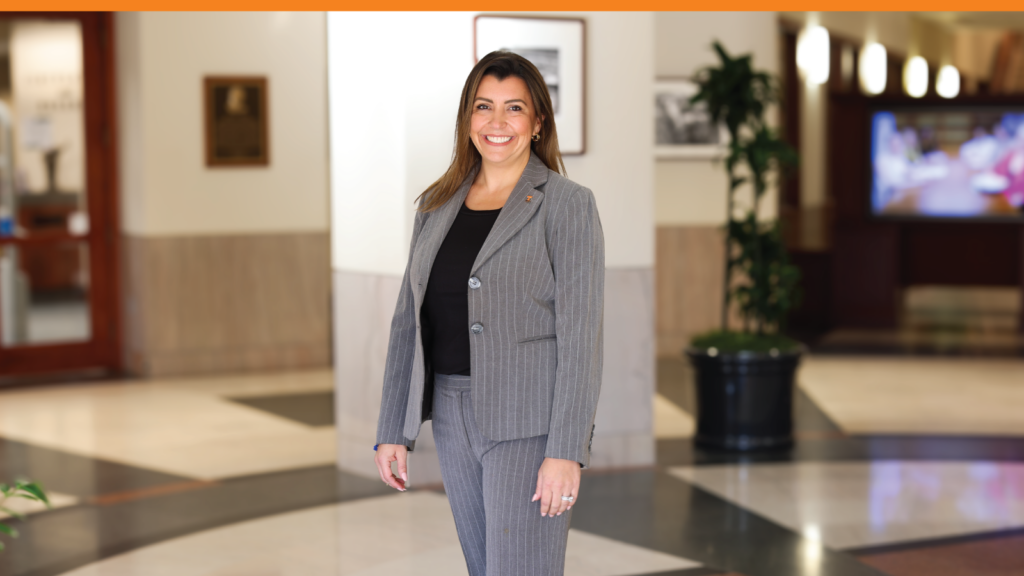Launched in 2021, the online Master of Legal Studies (MLS) program at the University of Tennessee College of Law is designed for professionals whose careers intersect with the law and who want to deepen their legal literacy without becoming attorneys. Eighty-five students are currently enrolled in the MLS program, with five more in the related Graduate Certificate Program in Legal Studies.
Tiffany Garner, director of executive education and non-JD programs and adjunct professor at Tennessee Law, says the program is about empowering students to become confident in their knowledge and understanding of the law. “This degree is designed for individuals whose work intersects with legal principles,” Garner says. “Our students are in human resources, they’re business owners, work for the government, or they work in the court system. Industries in both public and private sectors need individuals who can navigate the law but don’t need to practice it.”
When non-lawyers gain the ability to understand and handle legal principles and documents, Garner says, everyone wins. “The legal profession overall is elevated when the individuals who are preparing the evidence or reviewing the contract have a solid foundation in legal studies.”
The MLS program provides a solid foundation and legal understanding that is tailored to each student’s individual interests and needs. Students can choose courses that cover contract management and business law, human resources and employment law, state and local government, law and social welfare, and general legal studies. “We meet our students where they are to determine the best pathway to fulfill them professionally,” says Garner. For example, a student who works in a human resources role might want to take courses in criminal law, just to be able to understand it. “The program provides flexibility, and students are not siloed within a particular track. We want to give them options.”
Timing for program completion is also flexible, depending on students’ needs. Some students are working professionals taking one course at a time, funded by their employers, while others are full-time and want to move through the program in an expedited manner. The objective, from Garner’s perspective, is student success. “My goal is that they all complete the program.”
To date, the MLS and graduate certificate programs have seen students from a wide variety of backgrounds—among them medical staffers, expert witnesses, psychologists, professors, stay-at-home parents, court reporters, paralegals, and international students. “We’ve recently had someone start the program who is an ASL interpreter in court,” Garner says. “She wants to be able to understand the legal language she’s interpreting.”
The program’s benefits are as wide-ranging as the students themselves. “The courses enhance their ability to think like lawyers,” says Garner. “They learn how to analyze legal issues and apply legal knowledge to whatever their specific area of focus is.” A grasp of legal language and strategy can be a significant career advantage for professionals in many roles. “And the law really touches everything,” Garner adds.
MLS student Abeer Ali-Mustafa, who serves as senior advisor to the chancellor and associate vice chancellor for enrollment management and student affairs at the University of Tennessee Southern, chose to pursue the program because of her background in higher education and a desire to understand the intersection of law with academia. “The program surpassed my expectations,” Ali-Mustafa says. “The faculty members are experts in their fields, and they foster a collaborative learning environment, engaging with students in thoughtful and meaningful ways. The intellectual engagement and support I received have made this experience invaluable, equipping me with tools I will carry forward into my professional career.”
Graduate certificate student Xuhong Su says the program has aided her in her role as associate professor and director of graduate studies in the Baker School of Public Policy and Public Affairs at UT. “In particular, the certificate program arms individual students with the knowledge and tools to be legally smart and prepared for potential challenges,” Su says. “It’s opened new doors for me to see how the legal world works.”
Garner emphasizes the importance of programs like these for the legal community—and for society as a whole. “The MLS and graduate certificate programs give individuals a new skill set and a deeper understanding of the law, and that’s valuable for everyone.”
